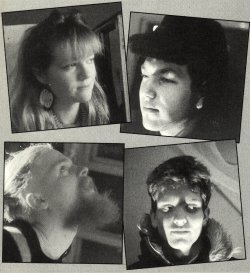
Turkey Mambo Momma
Turkey Mambo Momma at Pulpwiki
In the 1970s and early 80s John Peel used to travel around the UK playing “roadshows“. These weren’t live Radio 1 appearances at Butlins with Gary Davies, but smaller DJ gigs, often at universities, where he would, in his own words, “play lots of music that nobody liked very much. People would stand around looking glum and slightly puzzled.”
Jarvis, who had discovered punk and post-punk music via the John Peel show, took bassist Jamie Pinchbeck along to one of these nights at Sheffield Poly, paying 50p to get in. After John had finished his set, Jarvis and Jamie managed to corner him outside in order to give him a copy of the demo recorded in Ken Patten’s living room. “I’ll listen to it in the car,” John promised. And then, surprising as it may sound now, he did just that. A week and a half later, John’s producer John Walters called Jarvis at his gran’s house to offer the band a session.
This was a huge milestone for the band and a source of great excitement all round. Up until now Pulp had been a very minor name on the Sheffield scene, but having a Peel session would make them a much bigger deal. The show was in its post-punk heyday, and the list of sessions for 1981 includes The Cure, Siouxsie And The Banshees, The Fall, Killing Joke, The Teardrop Explodes, New Order and The Birthday Party.
A few weeks later (a month exactly after the day of the roadshow) the band, along with friend Lee Fletcher, took a hired Transit van full of semi-functional home-made, borrowed and secondhand equipment down to London’s Maida Vale studios. The producer for the session was Dale Griffin, former Mott The Hoople drummer, not a devotee of the DIY ethic, but a veteran of the early 70s, when rock musicians took their craft very seriously. Arriving at the studio sporting long hair and cowboy boots, he must have been at the very least bemused to see this collection of scruffy schoolboys struggling to set up their borrowed drumkit and propping the keyboard up on an ironing board. His direction to the group was just to set up at play like they were at a concert – an instruction the band roundly ignored. This was their first time in a proper studio, and the four tracks recorded feature a host of sound effects, double tracking and general experimentation.
Turkey Mambo Momma is perhaps the most experimental of the four, in terms of form, if not production. At first listen it sounds vivid and original, but on closer inspection the song has been repeatedly accused of being no more than a Frankenstein’s monster of post-punk Peel show influences. The greatest chunk of the thing seems to come from The Pop Group and Pigbag, the verses sounding like a sped-up version of ‘She is Beyond Good and Evil’ from The Pop Group’s ‘Y’. When the session was finally given a commercial release in 2006, Jarvis admitted as much:
“You can certainly tell that we’d been listening to the John Peel show fairly religiously for the past 4 years – “Turkey Mambo Momma” is one part “Gone Daddy Gone” by the Violent Femmes (we’d borrowed a xylophone from school) mixed with a bit of early Pigbag (Peter Dalton was given cornet lessons by a bloke who ended up being lead singer in The Thompson Twins).”
In 1981 the Violent Femmes were still buskers in New York, and Gone Daddy Gone wouldn’t be released until 1983, so Dolly’s xylophone parts may be a good deal more original than Jarvis gives him credit for… and while they definitely sound like *something* on the chorus, the way they shift into a minor key to accompany the second verse is inspired. Dolly’s double-tracked cornet solo does indeed start off like Pigbag, but within a few notes it has unravelled into a mess of tumbling, drunken sounds, almost free-jazz-like. It may have been little more than an accident, but his contributions here turn this homage into a secret success.
Elsewhere Wayne Furniss’s drumming is the weak link – fairly perfunctory and just about up to the job, but Jamie Pinchbeck’s steady, growling, funky bass line propels the song along very effectively until it gets lost in the mix somewhere halfway through the song.
Lyrically the song is, well, fairly strange. We’re lost on an island somewhere in the South Pacific with a feral goddess of a woman – a dangerous creature with destructive powers, but so irresistably attractive that Jarvis can’t help but give himself over to her, though he knows she will ruin him.
She steals all the fluid so vital to me
Impaled on the rocks as she tears me in two
At last I’ve found the answer and the answer is you
It’s one big malarial dream of a song, or perhaps a sunstroke-induced hallucination, and darkly, perversely sexual throughout. The arrythmic drive of the backing pushes Jarvis’s vocals into ever-more contorted emotional yelps. Though it’s the shortest track in the session, it’s got the most crammed into it, and it stands up perfectly well nearly thirty years later.
Tags: dangerous women, exotica, john peel sessions, post-punk, strange titles



